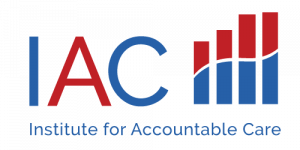Simulation of MSSP Benchmarking Policy Options
In June 2022, IAC received a grant from Arnold Ventures to develop simulation models to analyze the impact of policy options for redesigning MSSP ACO benchmarks. This project is extremely timely given the major changes in MSSP benchmarking proposed by CMS in the 2023 Medicare physician fee schedule. IAC will model a range of options using its access to 100% of Medicare claims data including: administrative benchmark updates; development of fully regional benchmarks; changes to MSSP downside risk requirements, and new incentives for MSSP participation. In addition to analyzing the financial impact of policy changes IAC will also model entry into and exit from the program based on alternative benchmark configurations. The objective of this grant is to inform CMS and the ACO community about how proposed changes will affect providers in Medicare accountable care models and future program savings.
Use of Episode Analytic Tools to Promote Specialist Engagement in Accountable Care
IAC is collaborating with six health systems to document and assess strategies for engaging specialists in value-based care. IAC’s current perspective on this issue is summarized here. This work will then drill down into the cardiac service line. IAC will work with participants to co-design a series of cardiology and cardiac surgery performance reports using Medicare claims data and the Episode Grouper for Medicare (EGM). As the reports are completed IAC will work with the participants to develop use cases for the analysis including performance reporting and design of specialist financial incentives. In a second phase of the project, IAC will analyze policy options for incorporating bundled payments into Medicare total cost of care models. Specific objectives of this work are to quantify the impact of bundle-ACO overlap and model alternative participation requirements, precedence rules, financial reconciliation, and gainsharing.
ACO Participation in Home-Based Care Initiatives
The Institute conducted a survey of 151 ACOs in late 2019 to understand their home-based care initiatives. Two-thirds of the ACOs reported either formal home-based programs, informal home-based services, or active development of new programs. ACOs home-based programs including primary care, hospital-level acute care, community paramedicine, care transition support and community health worker programs. Most ACOs surveyed were interested in expanding their use of home-based care. The principal challenges were establishing a sustainable financial model and measuring return on investment (ROI). The study was published in the American Journal of Managed Care.
Synopsis of Key Areas in the Recent Academic Literature on Accountable Care
Working with the Council of Accountable Physician Practices the Institute convened a group of leading experts to discuss future priorities for accountable care research. To prepare for the roundtable the Institute prepared a synopsis of recent literature focusing on multi-specialty group characteristics and performance; organizational structure and characteristics; risk sharing and financial arrangements; care redesign initiatives; ACO financial performance; and Medicare Advantage.
Implementing a Claims-Based Falls Measure for Medicare Beneficiaries
The Institute worked with teams from the University of Michigan and the Altarum Institute to implement a claims-based algorithm for identifying and measuring the cost of falls. This measure is being used to monitor the impact of public health interventions to reduce falls among elders across eight communities with wide variations in fall rates. Using our comprehensive, longitudinal Medicare claims data set we have created national snapshots of fall rates across the country to help ACOs, provider and policy makers identify falls “hot spots” and track the impact of fall reduction initiatives.
Analysis of Telehealth Utilization During the COVID-19 Pandemic
In partnership with the West Health Institute we are analyzing telehealth utilization in 2020 to assess how effectively different types of provider organizations deployed telehealth services; what types of beneficiaries receive telehealth services; and how patterns of service vary across regions. This study uses a 100% national sample of 2020 monthly claims data and includes interviews with ACO leaders to assess how organizations are rolling out telehealth and what challenges they have encountered.
Risk-Contracting in Accountable Care Organizations
As part of the National Association of ACOs 2018 ACO Survey we asked respondents to report whether they had ACO contracts with traditional Medicare, Medicare Advantage, commercial, and Medicaid plans. Within each category ACOs reported participation in: one-sided shared savings, two-sided shared risk, and full-risk capitation contracts. In addition ACOs were asked to report their principal strategies for managing spending and the major challenges they face in managing risk contracts. An analysis of survey results can be found here.
Initiatives to Improve Care for High-Cost, High-Need Patients in Accountable Care Organizations
The Institute is committed to helping ACO improve care for high-need, high-cost patients. We have the ability to analyze spending and health outcomes for specific segments within this population using an algorithm developed at Harvard University. In 2018 the Institute conducted a survey of ACOs to assess the initiatives they have put in place to improve care for medically and socially complex beneficiaries. See a summary of findings.

